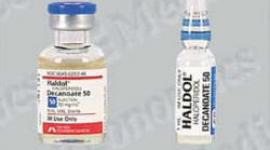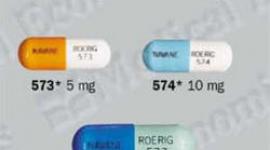Trilafon (Perphenazine) Patient Information
Find out why Trilafon is prescribed, side effects of Trilafon, Trilafon warnings, effects of Trilafon during pregnancy, more - in plain English.
Generic name: Perphenazine
Brand name: Trialafon
Pronounced: TRILL-ah-fon
Full Trilafon Prescription Information
Why is Trilafon prescribed?
Trilafon is used to treat schizophrenia and to control severe nausea and vomiting in adults. It is a member of the phenothiazine family of antipsychotic medications, which includes such drugs as Mellaril, Stelazine, and Thorazine.
Most important fact about Trilafon
Trilafon can cause tardive dyskinesia, a condition marked by involuntary muscle spasms and twitches in the face and body, including chewing movements, puckering, puffing the cheeks, and sticking out the tongue. This condition may be permanent and appears to be most common among older adults, especially older women. Ask your doctor for more information about this possible risk.
How should you take Trilafon?
Trilafon should be taken exactly according to physician instructions and for no longer than necessary.
--If you miss a dose...
If it is within an hour or so after the scheduled time, take the forgotten dose as soon as you remember. If you do not remember until later, skip the dose and go back to your regular schedule. Never take 2 doses at once.
--Storage instructions...
Trilafon should be stored at room temperature.
What side effects may occur with Trilafon?
Side effects cannot be anticipated. If any develop or change in intensity, inform your doctor as soon as possible. Only your doctor can determine if it is safe to continue taking Trilafon.
- Trilafon side effects may include: Allergic reactions, asthma, bizarre dreams, blood disorders, blurred vision, body spasms, breast enlargement in males and females, breast milk production, cardiac arrest, changes in sex drive, confusion, constipation and intestinal problems, diarrhea, difficulty swallowing, dizziness, drowsiness, dry mouth, exaggerated reflexes, eye changes and disorders, faintness, false-positive pregnancy test results, fast or slow heartbeat, fever, fixed stare, headaches, high or low blood pressure, high or low blood sugar, high pressure in the eyes, hives, hyperactivity, inappropriate excitement, increased appetite and weight, inhibition of ejaculation, insomnia, irregular heartbeat, itching, large or small pupils, lethargy, light sensitivity, limb aches, liver problems, lockjaw, loss of appetite, loss of coordination, lupus-like symptoms, menstrual irregularities, muscle weakness, nasal congestion, nausea, numbness, pallor, paranoia, Parkinsonism (rigidity and tremors), protruding or aching tongue, restlessness, salivation, seizures, skin rash or redness, slurred speech, stupor, sweating, swelling of the arms and legs, swelling of the ear, swelling of the face or throat, tardive dyskinesia (see Most important fact), tics, throat tightness, twisting or spasms of the neck and mouth muscles, urinary problems, yellow skin or eyes, vomiting
Why should Trilafon not be prescribed?
People who are comatose or who are at reduced levels of consciousness or alertness should not take Trilafon. Nor should those who are taking large amounts of any substance that slows brain function, including barbiturates, alcohol, narcotics, pain killers, and antihistamines.
Trilafon should also be avoided by people who have blood disorders, liver problems, or brain damage It cannot be taken by anyone who is hypersensitive to its ingredients or to related drugs.
Special warnings about Trilafon
Drugs such as Trilafon are capable of triggering a potentially fatal condition known as Neuroleptic Malignant Syndrome. Symptoms include high fever, muscle rigidity, altered mental status, unstable blood pressure, a rapid or irregular heartbeat, and excessive sweating. If any of these symptoms develop, see your doctor immediately; Trilafon therapy should be discontinued.
Also report any significant increase in body temperature to the doctor. It could be an early warning that you cannot tolerate the drug.
Alert your physician before taking Trilafon if you are going through alcohol withdrawal, suffer from convulsions or seizures, or have a depressive disorder. You'll have to use the drug with caution.
Caution is also warranted if you have kidney problems or trouble breathing. The doctor will periodically monitor your kidney and liver function and check your blood count for possible side effects.
Be sure to let the doctor know if you've ever had breast cancer. Trilafon stimulates production of a hormone that promotes the growth of certain types of tumors.
Be aware that Trilafon may impair the mental or physical abilities needed to drive a car or operate heavy machinery. Also, avoid prolonged exposure to the sun since Trilafon may increase sensitivity to light.
Stomach inflammation, dizziness, nausea, vomiting, and tremors may result if Trilafon is stopped suddenly. Therapy should be discontinued only under a doctor's supervision.
Trilafon is not recommended for children under the age of 12 years.
Possible food and drug interactions when taking Trilafon
If Trilafon is taken with certain other drugs, the effects of either could be increased, decreased, or altered. It is especially important to check with your doctor before combining Trilafon with the following:
Antidepressants such as Elavil, Nardil, and Prozac Antihistamines such as Benadryl and Tavist Antipsychotic medications such as Mellaril and Thorazine Antiseizure drugs such as Dilantin Barbiturates such as Nembutal and Seconal Drugs that quell spasms, such as Donnatal and Levsin Narcotic painkillers such as Percodan and Vicodin Phosphorus insecticides Tranquilizers and sleep aids such as Halcion, Valium, and Xanax
Because Trilafon prevents vomiting, it can hide the signs and symptoms of overdose of other drugs.
If you are scheduled for an operation, be sure to tell the surgeon that you are taking Trilafon, since it may change the amount of anesthesia you require.
Special information if you are pregnant or breastfeeding
Safe use of Trilafon during pregnancy and breastfeeding has not been established. The possible benefits of taking Trilafon must be weighed against the possible hazards to mother and child.
Recommended dosage for Trilafon
The dosage of Trilafon is adjusted according to the severity of the condition and the drug's effect. Doctors aim for the lowest effective dose
SCHIZOPHRENIA
The usual initial dosage of Trilafon tablets is 4 to 8 milligrams 3 times daily, up to a maximum daily dose of 24 milligrams. Hospitalized patients are usually given 8 to 16 milligrams 2 to 4 times daily, up to a maximum daily dose of 64 milligrams.
SEVERE NAUSEA AND VOMITING IN ADULTS
For this problem, the usual dosage of Trilafon tablets is 8 to 16 milligrams daily divided into smaller doses. Up to 24 milligrams daily is occasionally necessary.
Overdosage of Trilafon
Anyone suspected of having taken on overdose of Trilafon should be hospitalized immediately for emergency treatment.
- Usual symptoms of Trilafon overdose include: Stupor, coma, convulsions (in children)
Victims may also exhibit symptoms such as rigid muscles, twitches and involuntary movements, hair-trigger reflexes, loss of coordination, rolling eyeballs, and slurred speech.
Full Trilafon Prescription Information
Detailed Info on Signs, Symptoms, Causes, Treatments of Schizophrenia
APA Reference
Staff, H.
(2009, January 3). Trilafon (Perphenazine) Patient Information, HealthyPlace. Retrieved
on 2025, April 20 from https://www.healthyplace.com/other-info/psychiatric-medications/trilafon-perphenazine-patient-information

